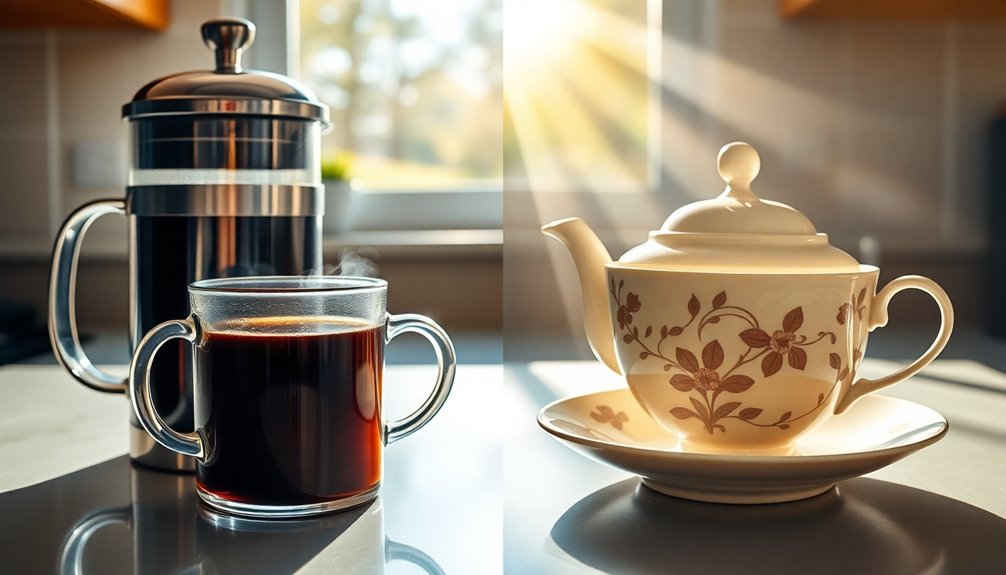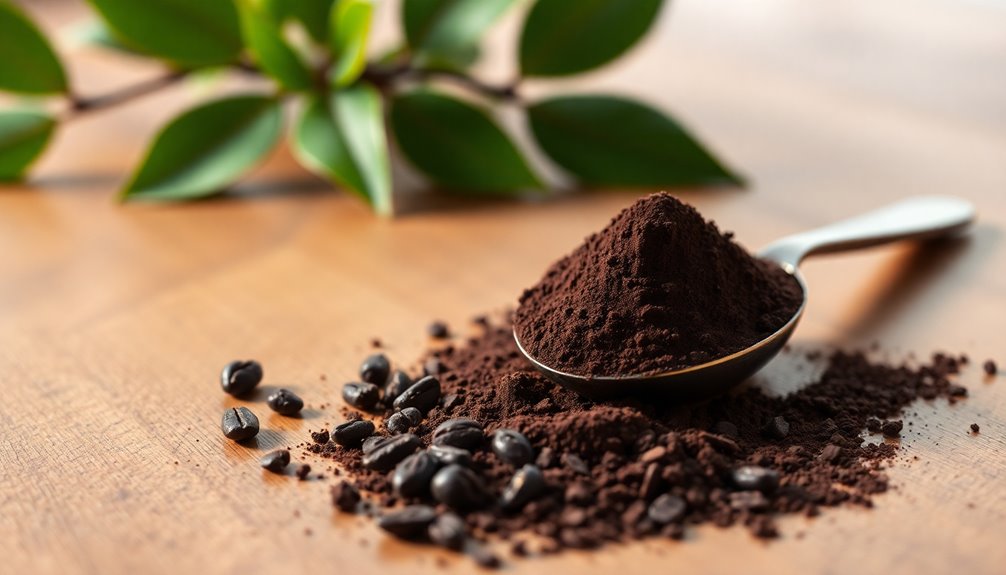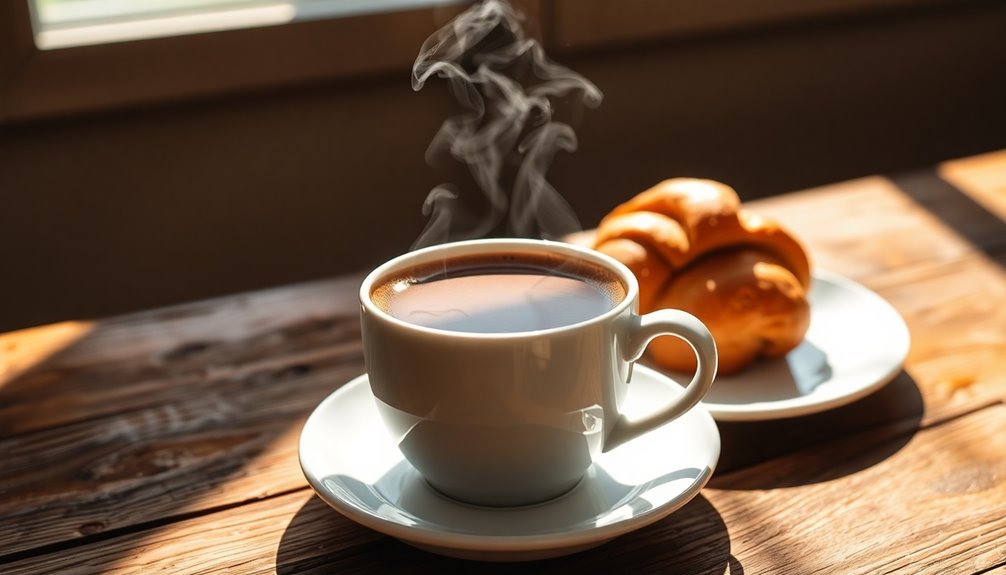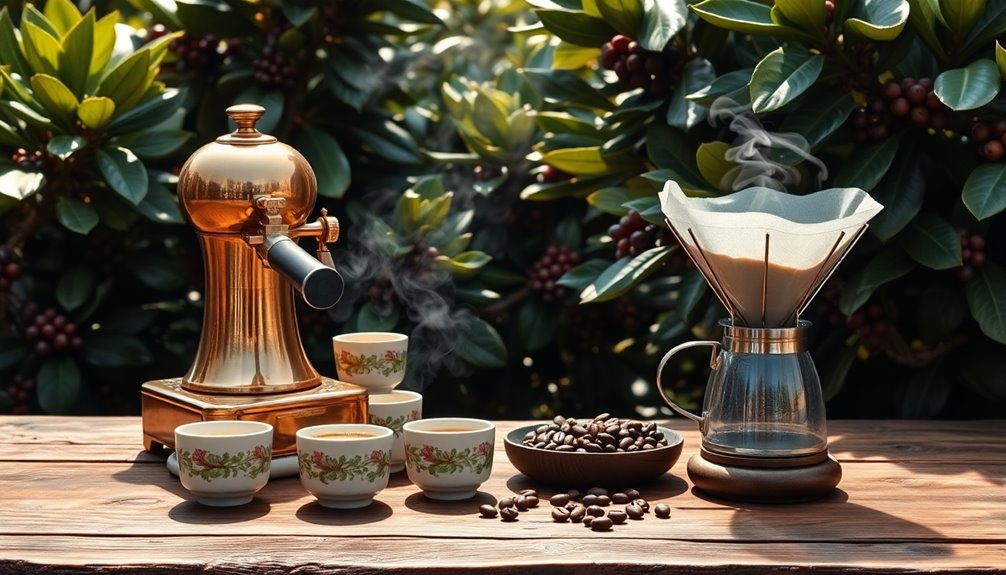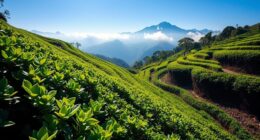When choosing between tea and coffee for your morning routine, it boils down to what you need. Coffee packs a stronger caffeine punch, giving you a quick energy boost, while tea offers a gentler lift with added calmness from L-theanine. Both beverages are rich in antioxidants and have unique health benefits, like heart health support. Preparation time also varies; coffee brews faster, but tea can be easier on the environment and your wallet. Whichever you prefer, you'll find benefits. Stick around to uncover more details on how your choice affects your mornings!
Key Takeaways
- Coffee provides a higher caffeine boost, making it ideal for a quick energy surge in the morning.
- Tea offers a more gradual caffeine release, promoting calm focus without jitters.
- Both beverages are rich in antioxidants, supporting overall health in your morning routine.
- Tea has a lower environmental impact, making it a more sustainable choice for eco-conscious consumers.
- Cost-wise, switching from coffee to tea can lead to significant savings over time.
Caffeine Content Comparison
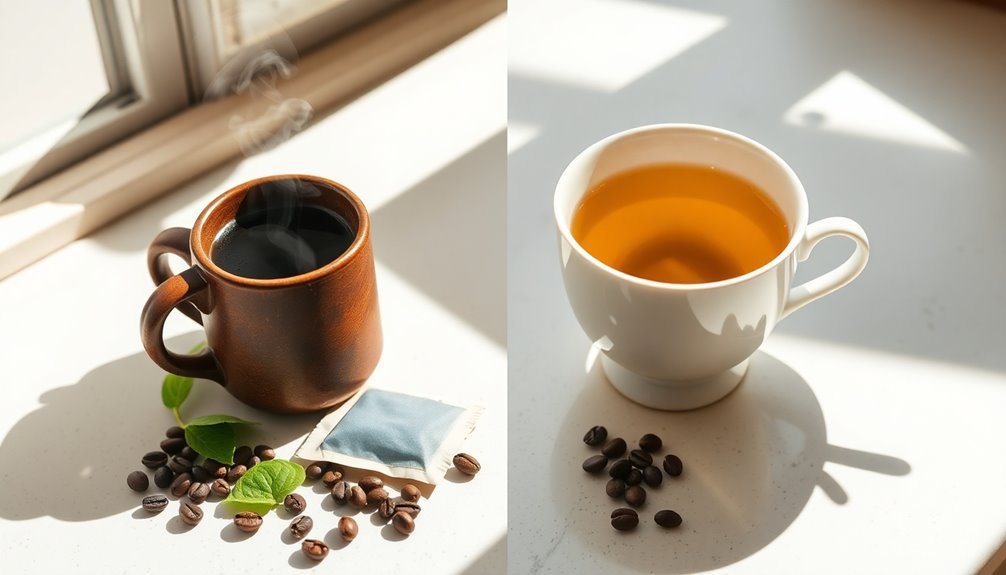
When comparing caffeine content, you'll find that coffee generally packs a stronger punch than tea.
An average cup of brewed coffee contains about 95 mg of caffeine, while a cup of black tea has only 47 mg. Although tea leaves contain around 3.5% caffeine, the brewing process extracts more caffeine from coffee beans, resulting in higher caffeine levels per cup. Additionally, cold brew coffee generally has higher caffeine content than regular brewed coffee, averaging 200-300 mg per 16 oz serving. The caffeine-free herbal teas provide a soothing alternative for those sensitive to caffeine.
Different types of tea impact caffeine content as well; for example, matcha can deliver 35 mg per half-teaspoon serving. Factors like steeping time and tea bag quality also play a role.
If you’re looking for a serious caffeine kick, coffee is your best bet, while tea offers a gentler boost. If you prefer a more refreshing and creamy option, you could try an iced tea latte recipe. This combines the benefits of tea with the richness of milk, providing a satisfying and energizing beverage. Consider experimenting with different types of tea and sweeteners to find the perfect combination that suits your taste buds.
Health Benefits Overview
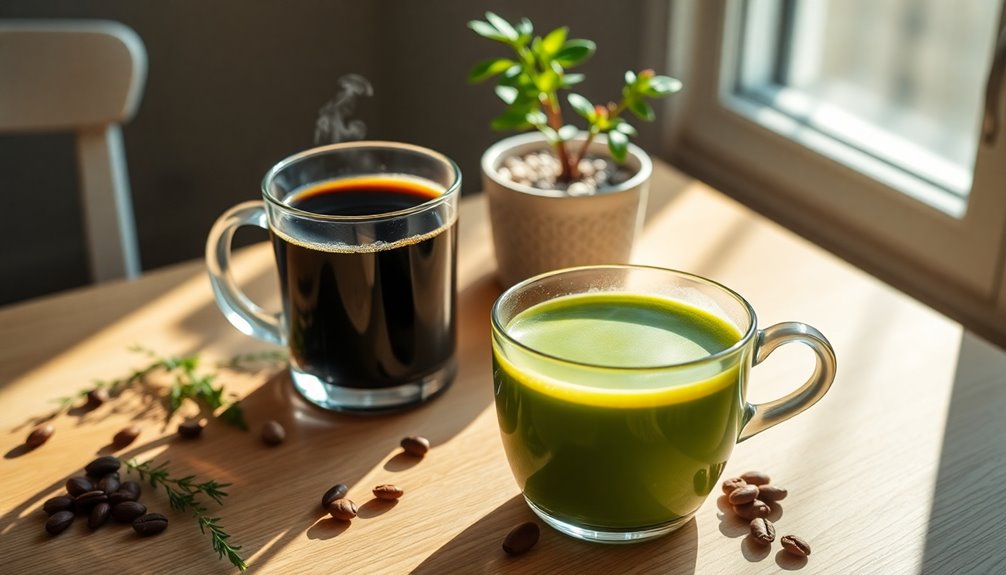
While caffeine content plays a significant role in your choice between tea and coffee, the health benefits of each beverage can't be overlooked.
Both drinks are packed with antioxidants, which help neutralize harmful free radicals. Coffee offers chlorogenic acid, protecting cells from damage, while tea, particularly green tea, boasts catechins linked to better heart health and reduced cancer risk. Regular tea consumption can lower blood pressure and stroke risk, while moderate coffee intake may reduce heart disease risk. Additionally, coffee has been associated with lower rates of depression, highlighting its potential mood-enhancing effects.
You'll also find that coffee enhances mood and alertness, whereas tea, with its L-theanine, promotes calm focus. Additionally, incorporating either beverage can enhance long-term health outcomes when consumed regularly.
Incorporating either into your routine can contribute to overall wellness, as long as you keep sweeteners and creams in check.
Flavor Profiles Explored

Exploring the flavor profiles of tea and coffee reveals a rich tapestry of tastes that cater to diverse preferences.
Coffee offers a spectrum, with African beans presenting fruity and floral notes, while Indonesian varieties deliver earthy and spicy flavors. You'll find that Arabica beans are softer and sweeter, whereas Robusta tends to be more bitter. Roasting levels further define coffee's character, from mild light roasts to intense dark ones. Additionally, coffee is rich in antioxidants, which can enhance your overall health. The choice of brewing method can also significantly influence the caffeine content and flavor nuances of the final cup.
On the other hand, tea showcases a variety of flavors, from the robust and smoky notes of black tea to the delicate, grassy sweetness of green tea.
Herbal teas expand the palette with floral and fruity options. Each beverage provides a unique sensory experience, tailored to satisfy your taste buds.
Preparation Time Analysis
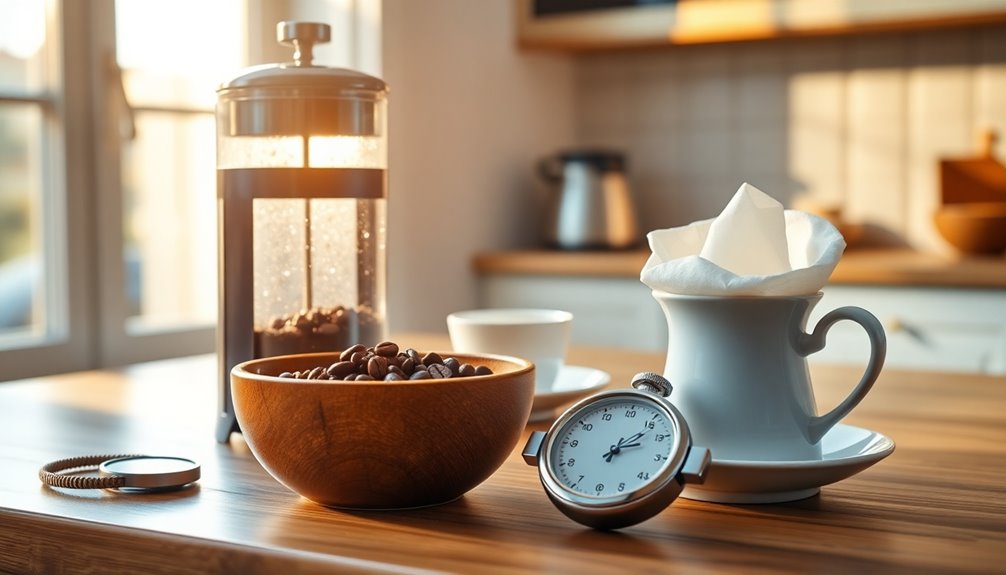
Preparation time can significantly influence your morning routine, whether you prefer tea or coffee.
If you're sipping black tea, expect to wait about 3-5 minutes for it to steep after boiling water. Green and white teas require slightly less time, just 2-3 minutes, while cold brew tea can take several hours. Using freshly drawn water enhances the flavor of your tea, making the wait worthwhile.
On the coffee side, drip coffee brews in about 4-5 minutes, while a French press takes a quick 4 minutes.
If you're in a rush, espresso is your fastest option, extracting in just 25-30 seconds. Cold brew coffee, however, demands patience, steeping for 8-24 hours.
Environmental Impact Assessment

How do your morning beverage choices impact the planet? When you choose tea over coffee, you're likely making a more environmentally friendly decision.
Tea generally has a lower environmental footprint, requiring less water—about 34 liters per cup compared to coffee. Its minimal processing and less packaging waste also contribute to a smaller footprint. Plus, loose-leaf tea eliminates the waste associated with tea bags. Additionally, coffee beverages produce five times more CO2 emissions than tea throughout its life cycle, particularly due to roasting and transportation. Furthermore, choosing sustainable forestry practices can enhance the eco-friendliness of beverage production.
Sun-grown coffee farming can lead to deforestation, worsening its environmental impact. By opting for sustainable tea or responsibly sourced coffee, you can support practices that mitigate harm to our planet. Sustainable tea farming and responsibly sourced coffee can help protect valuable ecosystems and preserve biodiversity. Additionally, these practices can also promote fair labor practices and support local communities. With the advancement of coffee blooming science, there are now more environmentally friendly techniques and technologies available to minimize the impact of coffee farming on the environment. By choosing sustainable tea or responsibly sourced coffee, consumers can contribute to the conservation of natural resources and the protection of our planet.
Cost Comparison Insights
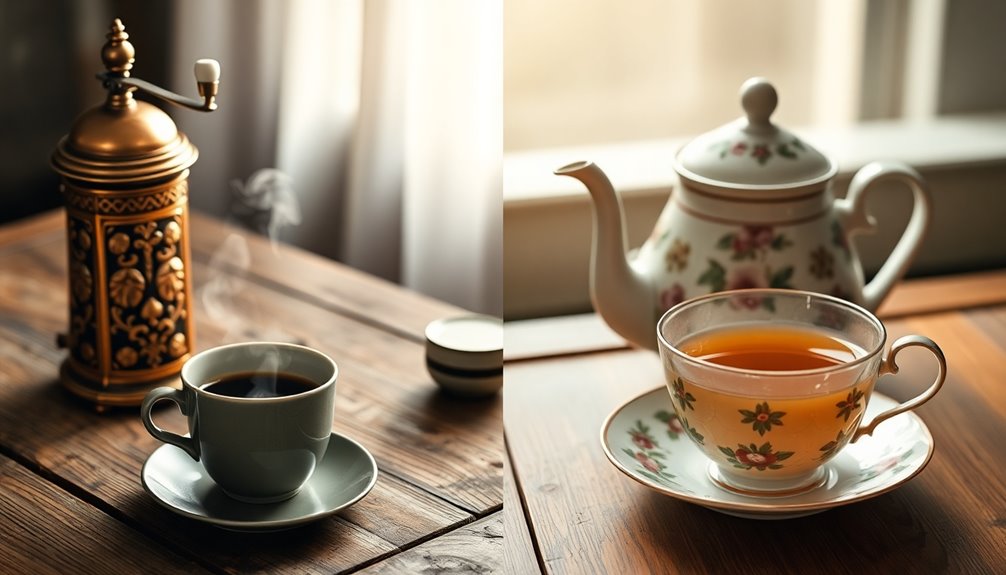
When it comes to your morning beverage, cost can play a significant role in your decision-making. On average, a cup of tea costs about $3.74, while regular coffee is cheaper at $3.08. If you prefer cold brew or lattes, be prepared to spend even more—around $5.14 and $5.46, respectively. Depending on where you live, prices can vary greatly. For instance, Hawaii has the highest costs for both tea and coffee. Additionally, cold brew prices follow similar trends to regular coffee, indicating that consumers might want to consider their options carefully. When you break it down, black tea costs just $21 annually for three mugs a day, while coffee with cream can skyrocket to $315. Switching to black tea could save you about $600 a year for two people. It's clear that tea offers significant savings.
Frequently Asked Questions
Can Tea and Coffee Be Mixed for a Morning Drink?
Yes, you can mix tea and coffee for a morning drink!
Many cultures, especially in Asia, have been doing this for a while. You can brew them separately and combine them, or even mix tea leaves directly into your coffee.
Adjust the ratio to suit your taste, and consider adding flavors like vanilla or coconut.
This blend can give you a unique flavor profile while offering sustained energy without the jitters.
What Are the Best Herbal Teas for Energy?
If you're looking for the best herbal teas to boost your energy, consider trying ginger tea for its anti-inflammatory benefits, or peppermint tea to enhance alertness.
Yerba mate offers a caffeine kick without the jitters, while licorice root tea provides natural vitality.
Hibiscus tea, rich in vitamin C, supports overall health.
Experiment with different blends and brewing methods to find what energizes you the most throughout your day!
How Do I Choose High-Quality Coffee or Tea?
To choose high-quality coffee or tea, look closely at the beans or leaves.
For coffee, seek specialty grade, single-origin varieties with certifications like organic. Pay attention to flavor profiles and roasting methods.
For tea, assess the leaf quality, aroma, and infusion characteristics. High-quality options should have a rich taste and satisfying mouthfeel.
Always prioritize products from reputable sources to ensure you're enjoying the best quality in every cup.
Can I Drink Coffee or Tea on an Empty Stomach?
Drinking coffee or tea on an empty stomach isn't always the best idea. Both can increase acidity, leading to discomfort or digestive issues.
Coffee may elevate cortisol levels, causing jitters and anxiety, while tea can interfere with nutrient absorption due to its tannins.
If you choose to have either, consider having a light snack first to mitigate these effects, and make sure to stay hydrated to avoid dehydration from their diuretic properties.
Are There Any Side Effects of Excessive Caffeine Consumption?
Yes, excessive caffeine consumption can lead to several side effects.
You might experience an increased heart rate, insomnia, and anxiety. Physical symptoms like an upset stomach or headaches can also occur.
In severe cases, you could face more serious risks like chest pains or even seizures.
If you notice any of these symptoms, it's a good idea to evaluate your caffeine intake and consider cutting back to avoid these negative effects.
Conclusion
Ultimately, whether you choose tea or coffee for your morning routine depends on your personal preferences and lifestyle. If you need a quick caffeine boost, coffee might be your go-to. On the other hand, if you're looking for a gentler lift with added health benefits, tea could be the right choice. Consider the flavor, preparation time, and even the environmental impact when making your decision. Whichever you pick, enjoy your morning ritual and savor every sip!
